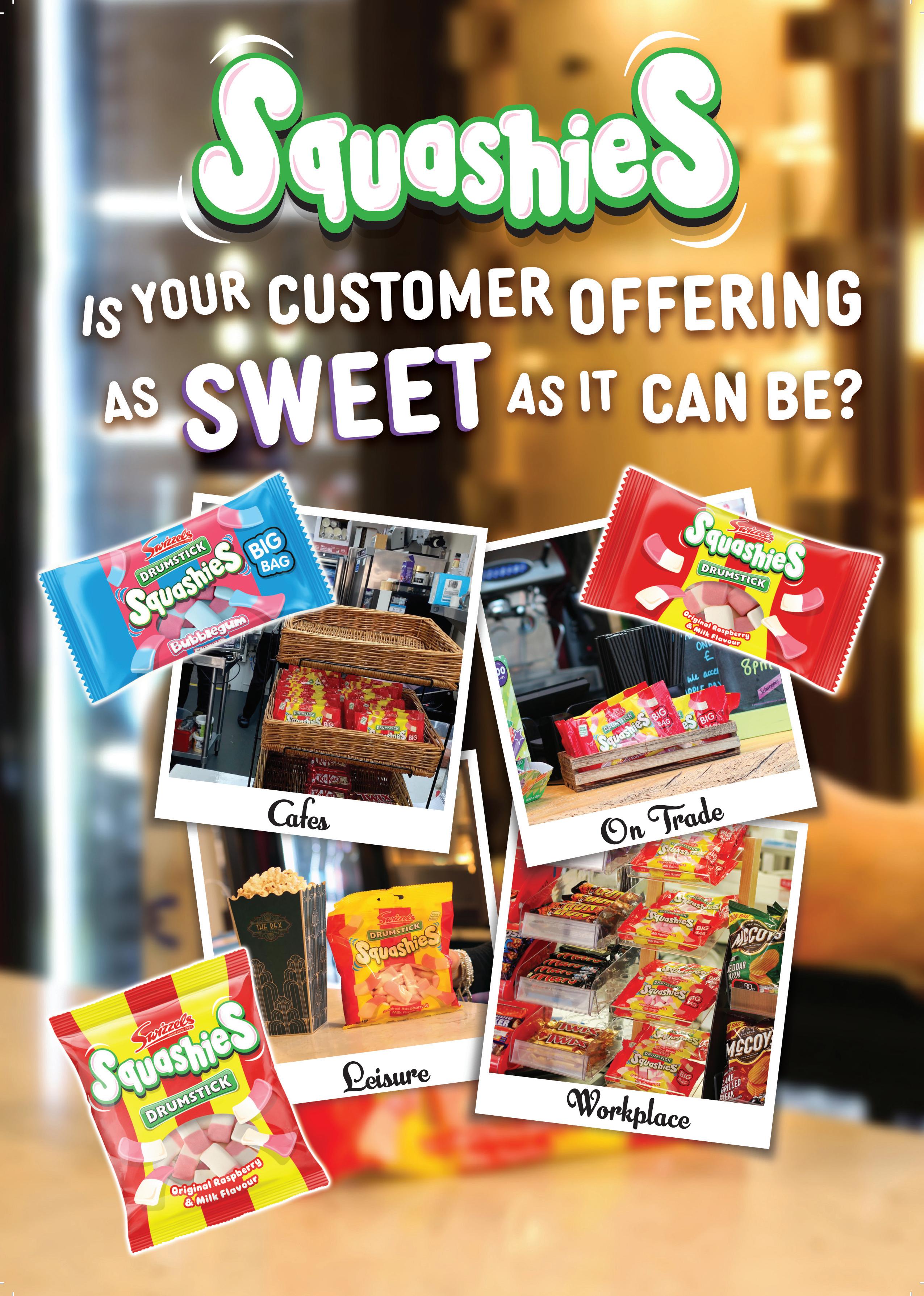/

THE VICTOR PIZZA CO
IT’S V FOR VICTORY FOR THE CREATORS OF A SCOTTISH PIZZA INSTITUTION
CREMOLINEA (TAS GROUP)
GROWTH WITH PURPOSE — HOW TAS GROUP IS PACKAGING UP SUCCESS

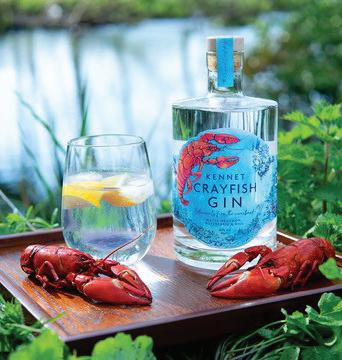


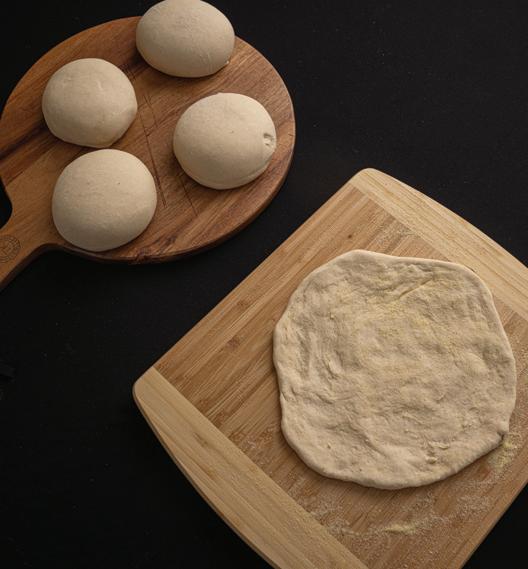




/

IT’S V FOR VICTORY FOR THE CREATORS OF A SCOTTISH PIZZA INSTITUTION
GROWTH WITH PURPOSE — HOW TAS GROUP IS PACKAGING UP SUCCESS









PUBLISHER
Planet Media & Design Ltd
Brooke’s Mill, Huddersfield HD4 7NR
MANAGING DIRECTOR
Jillian Evans
NATIONAL SALES MANAGER
Shazia Hussain
CHIEF EDITOR
David Barnett
SUB-EDITOR
Abigail Wears
CONTACT US:
FACEBOOK @food&drinkmagazine
INSTAGRAM @foodanddrinknews
TWITTER @food_drink_news
CONTRIBUTE info@planet-media.co.uk
ADVERTISING advertising@planet-media.co.uk
EDITORIAL editorial@planet-media.co.uk
MAG SUBSCRIPTIONS subscriptions@planet-media.co.uk

The food and drink in industry is a major driver of the country’s economy, but we have seen in recent years how external factors and forces can affect it in many ways.
Pandemics, wars and cost of living increases show just how fragile any sector that relies on consumer spending is. But there are also positive ways that the sector can be influenced.
A dry, warm Spring and early summer meant good news for many areas of the food and drink industry, especially those who do their business out of doors, such as food-to-go and drinking. While the business might seem sometimes precarious, and at the whim of forces beyond our control, sometimes it does get a bit of good news!
David Barnett CHIEF EDITOR


The crayfish season has started and ready for the summer menus. This year’s new season of wild crayfish are now shipping from the 16th of June onwards. It is anticipated that that there will be a rush of orders after a six-month hiatus when the crayfish go to ground. This wonderful delicacy, popular in salads, pasta dishes, boils, seafood mixes and BBQ style grills are proving a treat in restaurants, gastropubs, wedding catering and for home indoor and outdoor parties.
Trapped in the nutrient rich chalk stream
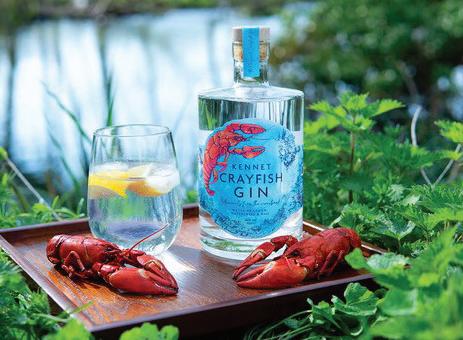
waters of the River Kennet in Berkshire, England, the wild
Crayfish Company are fresh, humanely processed and delivered chilled, next day to your door; pair the menus with Kennets award winning gin to enjoy a real taste of summer.
The Kennet crayfish are available fresh par-cooked & fully cooked. They also come in cooked ready to eat Micvac packs of 500g Net Weight in brine or in a Swedish style sauce with 21 days refrigerated shelf-life. Kennet Crayfish can be purchased from the website www.kennetcrayfish.com
London food outlets can now offer Delice de France’s bakery products without the need to prepare them on site.
Delice de France, the leading supplier of bread and bakery, is launching Delice Fresh, a new service that enables any Londonbased food outlet to sell ready-made morning goods and treats with no production required.
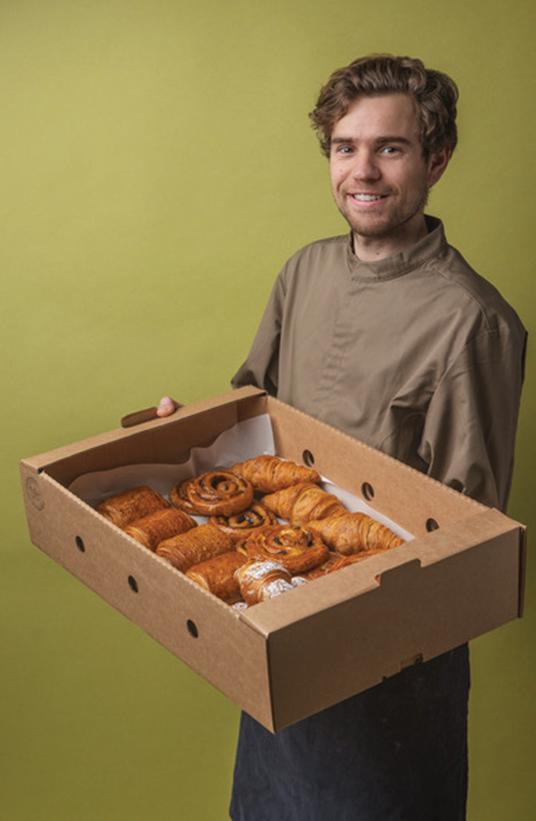

Delice Fresh offers a selection of 28 bestselling products from Delice’s marketleading range of sweet and savoury bakery products. The range includes sweet morning goods, such as buttery croissants, pain au chocolats and pain aux raisins, at a range of price points to suit different outlets, as well as chunk cookies and artisan breads, including baguettes, rolls and bloomers.
Operators can order up to 4pm to receive their oven-fresh delivery the following morning, seven days a week. Delice Fresh offers stores and operators greater efficiency, more convenience and a reliable service.
As no on-site baking is required, Delice Fresh can be a solution for any sized food outlet that wants to unlock higher margins with quality food to go.
Delice de France estimates that its Delice Fresh service could save some operators up to 1.5 hours per day in defrosting, baking, cleaning, and other operational costs associated with food preparation.
The service is headed by Arthur Magne, who has a wealth of experience in bakery startups and delivery expertise. Combining his knowledge with Delice de France’s logistical capabilities has provided the foundations for Delice Fresh.
“We’re liberating London’s food outlets

from the constraints of the baking schedule, enabling them to offer premium bakery lines without the burden of production,” he said.
“We can provide complete flexibility for our customers while continuing to offer the quality that Delice de France is famous for. We are already seeing orders coming in from both current Delice de France customers and new ones.”
Claudia Marinello, owner of Luis' Cafe, a small coffee shop in central London that has ordered from Delice Fresh several times, said: “Delish Fresh is a great option for small businesses like ourselves that are limited with space.
“We’ve had excellent service from a great team, starting from the rep all the way to the delivery driver.”
A solution for every requirement in the highest quality: EFAFLEX now offers all this with its “Next Generation” high-speed doors. The uniform concept offers many advantages.
Just in time for its 50th anniversary, EFAFLEX presents an evolution of its spiral door: the "Next Generation" high-speed doors. The solution is a modular system with four door types, all based on the same door concept. The result is a wealth of possibilities for customers.
Doors can be configured according to the modular principle
That means that each of the four different door types comes in three different variants – giving a total of twelve different doors. These are available with pre-configured equipment packages. In addition, special requests, such as a slanted end-shield, can be implemented quickly and directly at any time. The control can also be integrated into the curtain box to save space.
In the Premium version, each of the four door types comes with safety equipment including an EFA-TLG® door light grid, a manual emergency opening lever and spring breakage detection in both frames. In addition, the symmetrical door design features pivotable frame covers. This significantly simplifies maintenance and repair – especially in combination with EFA-SmartAssist®. EFA-SmartAssist® is a digital support tool with a remote diagnostic function via video link that provides immediate and expert support from EFAFLEX staff.
At the same time, the standardisation of the door design and the use of identical parts simplifies the production of all product components, whilst maintaining the usual EFAFLEX quality. Each type of door is designed for up to 400,000 load cycles per year, which makes them extremely long-lasting and durable. But the "Next Generation" highspeed doors are also next generation in terms of sustainability. The modular principle of the "Next Generation" high-speed doors conserves resources, which significantly reduces the door's carbon footprint right from the production stage.
Energy consumption is also reduced as your buildings are used, with the amount of savings depending on the door configuration. EFAFLEX provides you with a "sustainability product passport" that includes all the necessary information about the sustainability of the door. This passport can be helpful for certifying your building.
The "Next Generation" high-speed door types at a glance
The EFA-SST® Therm minimises energy losses due to thermally separated EFA-THERM® insulation laths. As a result, the door also achieves an outstanding U value of 1.4 W/m²K and is thus our top performer in terms of sustainability. It is particularly suitable for closures in halls and buildings and is also suitable for noise protection applications due to the insulated laths.
The EFA-SST® Alux is very robust in its construction thanks to doublewalled aluminium laths and can withstand up to 400,000 load cycles per year. In addition, the door system is certified according to DIN EN 12424 with wind class 5, i.e. it can remain in operation even under the highest wind loads and offers the option of certified resistance class 2 (WK2/RC2) when appropriately configured. This applies to all doors with the exception of the EFA-STR® Flex.
The EFA-STT® Clear high-speed turbo door offers an impressively fast opening speed of 3.2 m/s. In combination with the EFA-CLEAR® transparent laths, which ensure a clear view with open lines of sight,

this door offers a high level of safety and speed in applications involving many people. The EFA-STT® Clear is also an eye-catcher, allowing lots of daylight into your building thanks to its transparent design.
The EFA-STR® Flex high-speed turbo roll-up door with opening speeds of up to 4.0 m/s enables efficient and fast logistics. The basis for this enormous speed is the door leaf, which is made of PVC-coated polyester fabric and reinforcements made of aluminium profiles, in combination with EFAFLEX spiral technology. The combination of flexible curtain and solid keder profiles is a very special feature on the door market. The great advantage of this model is that individual segments of the door leaf can be replaced separately.
The range of doors is rounded off by four optional equipment packages to suit specific requirements. One such package is the cold weather package, which is particularly suitable for an application range of -1 to -25 degrees. There is also a process package that can be used in logistics and manufacturing areas.
In addition, the “Security 1” package with mechanical locking and the “Security 2” package with automatic locking are also available. Both packages can be integrated into an existing alarm system.
From its origins in Bruckberg near Munich, EFAFLEX has evolved into a global market leader in the field of industrial high-speed doors, with more than 1,400 employees and representatives on all continents. The invention of the door spiral was an essential part of this development. To this day, this component ensures that the door leaf can be wound up quietly, quickly and almost wear-free.
Building off of this invention, numerous door variants have emerged in recent decades to suit every need. The “Next Generation” high-speed doors once again deliver proven EFAFLEX quality. Thanks to their customisability, they can meet almost any requirement. It has never been easier to get robust, durable and sustainable doors that will also make your buildings “fast forward” and fit for the future.
EFAFLEX produces high-speed doors for industrial applications. The company, which was founded in 1974, works for clients from industry, trade, food production, and the chemical and pharmaceutical industries, among others. As the only manufacturer in the field of high-speed industrial doors, EFAFLEX is listed in the world market leader index and is therefore one of the top 461 companies in Germany, Austria and Switzerland. The family company employs more than 1,200 people worldwide. With its headquarters in Bruckberg, Bavaria, EFAFLEX is firmly anchored as the largest employer in the region. In addition, the company opens up international markets with 10 subsidiaries on five continents. EFAFLEX generates over 40% of sales abroad.
EFAFLEX Press Contact: Ms Jasmin Jobst
Tel.: +49 8765 82-525
E-mail: Jasmin.Jobst@efaflex.com
Web: www.efaflex.com

Michelin-starred chef and BBC’s Great British Menu winner, Tom Shepherd, has embarked on an exciting new venture with the launch of Twofold Spirits, a premium spirits brand created in collaboration with his wife, Charlotte. Known for his innovative approach to flavour and his dedication to craftsmanship, Tom is now bringing his culinary expertise to the world of alcohol, offering unique and distinct flavour combinations designed for those with a curious palate.
Drawing on Tom’s extensive culinary background—honed in some of the UK’s most prestigious kitchens, including those of Sat Bains and Michael Wignall— Twofold Spirits is driven by a chef’s perspective on flavour. Tom approaches spirits the same way he does his food: with a focus on balance, depth, and storytelling. Each creation is meticulously crafted to surprise and delight, delivering complexity

and harmony in every sip.
“In the kitchen, I’m always exploring how flavours interact, evolve, and complement each other,” says Tom. “With Twofold Spirits, I’ve applied that same mindset— taking classic combinations and pushing them further, creating spirits that are layered, exciting, and rewarding to those who love to discover something new.”


Inspired by their shared belief that great food and drink moments are built on craft, balance, and experience, Tom and Charlotte have carefully curated a range of spirits that are perfect for sipping, mixing, or pairing with fine cuisine. From unexpected botanical blends to refined, nuanced
profiles, Twofold Spirits offers a bold new take on classic distilling traditions.
Twofold Spirits proudly introduces its inaugural products:
• Banana Rum: A delicious 40% ABV rumbased drink with tasting notes of natural banana, toasted caramel, and a hint of vanilla. This spirit works perfectly in any banana cocktail, is wonderful mixed simply with ginger beer, or can be sipped neat over ice.
• Thai Green Gin: A well-balanced and perfectly rounded 40% ABV gin bursting with aromatic flavours reminiscent of delicious, fragrant Thai spices. With tasting notes of juniper, lemongrass, coriander, kaffir lime, and a subtle hint of red chilli, this gin offers a unique twist on a classic spirit.
Whether enjoyed neat, in cocktails, or alongside Tom’s Michelin-starred dishes, Twofold Spirits is set to redefine the drinking experience, making it accessible to those with a thirst for discovery.
For interview requests, imagery or samples please ontact chad@chadteixeira.com or jess@chadteixeira.com

Futamura UK, the leading global manufacturer of sustainable cellulose films, commits to further investment in its UK site.
Following significant investment in recent years, in both machinery and site facilities, Futamura announces today a further £15 million project in its Wigton-based site to drive step changes in its sustainability and performance. This noteworthy investment will lead to emission reductions, energy efficiency improvements and a decrease in their product’s environmental footprint.
The manufacturer, who employs 270 people and has been based in Wigton for over 90 years, manufactures renewable flexible packaging films that are derived from woodpulp. Futamura fosters a culture for sustainability and innovation, their NatureFlex™ packaging films being certified for both home and industrial composting at end-of-life to support a reduction in packaging waste.
The new investment will enable a significant step change in the company’s drive towards net zero and notably reduce their emissions. The project, internally called WSA will divert waste gasses from the production process to generate a valuable raw material via an oxidation process. Heat generated as a byproduct of the chemical reaction will then be used to generate steam, the main energy utilised in the production process. Once
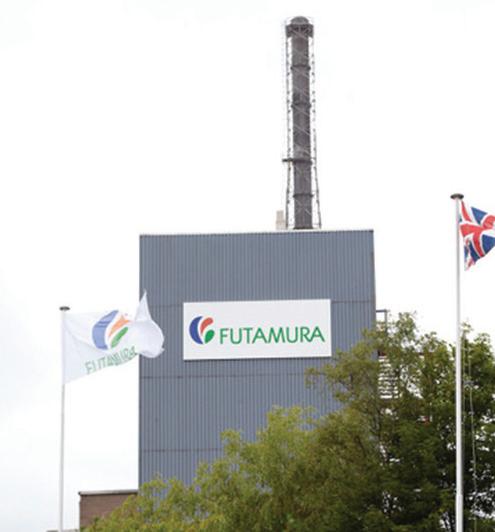
operational, this asset will generate 15% of the total energy requirement of the Futamura site. As a result, the packaging manufacturer will also be able to reduce the amount of natural gas bought from the grid, reducing carbon emissions and improving the footprint of its products.
This project will be the largest investment the Wigton site has undertaken since their Japanese owners purchased the cellulose plant in 2016. Futamura is delighted to confirm that the company has also been awarded a UK government grant of up to £4.5 million through the Industrial Energy Transformation Fund (IETF) to support this project. The grant from
the UK Government showcases the confidence in the site and the benefits this new venture will generate.
The company's managing director Adrian Cave commented: "I don’t think in my career, there has been a project that I have been more excited about. At Futamura we are passionate about our NatureFlex™ and Cellophane™ products, and we believe that this also means that we have to continually evolve and utilise greener manufacturing processes, to further reduce our environmental footprint. We are delighted that the IETF energy efficiency grant has resulted in this project coming to fruition. Transformational projects such as this WSA installation invariably are expensive and have a medium to long term payback. We are very grateful for this support.”
Markus Campbell-Savours, Member of Parliament for Penrith & Solway, welcomed the news. He said: “I congratulate Futamura on securing this investment, one of the largest grants to be issued in this round of IETF funding. This government is committed to helping industry reduce its energy consumption and this project will enhance the sustainability and future of this 90-year-old business. This is a huge boost to Wigton, and the hundreds of workers employed at the site."
When Swiss Butter opened its doors in Beirut in 2017, few could have predicted the ripple effect that would follow. What appeared to be a simple, pared-back menu, high-quality steak, golden fries, and a secret butter-based sauce, would soon revolutionize how the world views a once-traditional brasserie dish. By choosing focus over variety, founder Eddy Massaad didn’t just serve steak frites, he transformed it into a category-defining experience. Swiss Butter’s “less is more” ethos resonated across borders, proving that simplicity, when executed with precision, can be both luxurious and wildly scalable. It wasn’t long before food critics and F&B analysts coined a new term: “SFS”, Steak Frites Sauceofficially acknowledging the brand’s influence in shaping a new dining segment.
From Beirut to London, Dubai to Madrid, Swiss Butter’s blueprint has not just inspired

but outright spawned imitators. Some, like New York’s Skirt Steak and Sydney’s newest steak frites venues, offer respectful nods to the original. Others, such as Simple Butter in Lebanon and Butter Pan in Saudi Arabia, have mirrored everything from the plating and staff uniforms to the interior aesthetic. Yet none have matched the consistency, flavour, or cult following Swiss Butter continues to command.
What makes Swiss Butter untouchable isn’t just its signature sauce or iconic plate presentation. It’s the brand’s unwavering control over quality, atmosphere, and service. Each location, whether in Riyadh or Holborn delivers the same crave-worthy, elevated experience that first put the Beirut flagship on the map.
With over two-hour daily waits, viral social content, and expansion plans into new global markets, Swiss Butter is no longer a niche concept. It’s the face of a modern movement, one where a single, perfectly-executed dish has the power to disrupt dining culture worldwide.
While others may copy, Swiss Butter continues to lead, not just as the original, but as the standard-bearer for what steak frites has become: an accessible icon; globally craved.


Retail Express announces ‘Retail’s Journey to AI’ - a critical guide to assist retailers shape a strategic roadmap towards the future of data-driven intelligent merchandising powered by AI.
Retail Express, a leading provider of merchandising solutions and services for retail, has released a new whitepaper to help retailers plot a path to Artificial Intelligence (AI) in retail. Titled ‘Retail’s Journey To AI’, it provides a comprehensive guide to AI integration in retail, presenting AI as a journey that retailers can undertake to gain critical advantages in efficiency, customer experience, and market competitiveness. AI represents a transformative opportunity for retail, enabling better decision-making and operational efficiency. AI will provide the analytics that will support and even secure retail's future with a new way of doing business. However, AI adoption isn't optional but essential for competitive survival, with the guide emphasising that it is critical for retailers to take those first steps, however small, towards AI today.
Barry Grange, Retail Express CEO and Cofounder, states: “It is impossible to imagine a future in which retailers do not use AI. Without the pinpoint algorithmic insights and advanced data processing techniques offered by machine learning, retailers will be unable to face up to their competitors or provide the level of service that customers will come to expect. Retailers must simply keep up with technological evolution.”
‘Retail’s Journey to AI’ – A guide to AI in retail – Summary of sections:
The paper’s sections explore how AI is reshaping retail, from machine learning and generative AI to deep learning (1 & 2). It highlights AI’s growing role in merchandising, pricing, and supplier management - especially for medium-sized retailers competing with larger, AI-enabled rivals (3). Success depends on consolidating high-quality data (4) across all business areas and building secure, scalable cloud infrastructure (5). The paper also looks


ahead to emerging AI capabilities (6), including ethical use and governance as AI becomes more powerful, concluding with a practical roadmap (7).
whitepaper: Retail’s Journey to AI – Available for download now
Standing out and continually meeting customer demands in today’s fast-paced retail environment requires agility, precision, and the ability to outpace the competition. The shift to AI-driven technologies gives retailers the power of algorithmic retailing techniques to improve margins through efficiency, automation, and data-driven decision-making. AI can help improve inventory management, create next-level demand forecasts, revolutionise pricing strategies, and overhaul supply chain management.
However, the guide indicates that the first steps happen before any AI is put to work. Adopting an AI mindset and preparing for change is a manageable and necessary part of the transition. This is not a complete restart, but an acknowledgement of the challenges faced by retailers and the steps they must take to get AI ready. To do AI right, retailers should be able to offer it a
clean and consistent source of data –something which traditional retail practices have not supported in the past.
“Getting started is about establishing an AI mindset and preparing for scalable AI solutions. Retailers that embrace the process position themselves for long-term success in a future which will be driven by AI and bring themselves closer to those that are already part-way down the road. But every retail business is different and the options can be daunting, so we hope our new guide helps retailers make a start on that process sooner rather than later,” concludes Edward Betts, COO, Retail Express.
Download the free Retail Express whitepaper to learn more: https://www.retailexpress.com/r etail-in-ai/

After an initial rollout across its field operations, Bakers Basco’s use of body-worn cameras, on more than 120,000 investigative visits, has become a proven asset in supporting its investigations team, helping to safeguard officers, streamline evidence collection and reinforce the company’s zerotolerance stance on equipment misuse.
The use of The Partner MK4 body-worn cameras has now moved from trial to trusted tool. The technology has been embedded into daily operations following encouraging results in the field, results that have strengthened both the confidence and capability of the investigations team.
The body cams have proven their worth in several key ways. The ability to capture clear, encrypted footage and still images on the spot has transformed how Bakers Basco documents the unauthorised use of its reusable bread baskets and equipment. The photo function - previously unavailable in older models - has been especially valuable in recording decisive visual evidence that supports legal follow-ups.
“Initially, we wanted to test the technology in real-world situations,” explains Stacey Brown, national investigations manager at Bakers Basco. “What we found was that the cameras didn’t just help us collect better evidence, they changed the way our team approached investigations. They helped de-escalate tensions, backed

up officer accounts and significantly reduced time spent on admin-heavy reporting.”
Field investigators often face long days across multiple sites. The 15-hour battery life of the MK4 means officers can cover more ground without worrying about power, while infrared night vision ensures that surveillance continues seamlessly even in poor lighting. These features have been particularly useful in early morning or late evening recovery operations when equipment misuse is often discovered.
The footage is stored securely and accessed via DEMS body camera software, keeping all data GDPR-compliant and tamper-resistant, while also providing a centralised platform for reviewing and
refining investigation techniques.
The adoption of body cameras forms part of Bakers Basco’s wider commitment to protecting its staff. Alongside the MK4 rollout, the company recently equipped its team with protective body armour, following an increase in aggression faced by investigators during fieldwork. The combination of visible safety gear and recording equipment has created an additional deterrent against abuse while enhancing officer morale. “Our priority has always been safety and professionalism,” adds Brown. “The body cams have allowed our team to go into sometimes difficult situations with the assurance that they are protected, both physically and legally. We now have the tools to show exactly what happened, when, and how.”
Since the integration of the new bodyworn cameras, Bakers Basco has reported improvements in operational efficiency, evidence integrity and officer confidence. With fewer disputes and stronger documentation, the investigations team can focus more time on recovery efforts and less on reactive administration.
For an industry where lost or misused equipment can lead to substantial costs, Bakers Basco’s commitment to using proven tech in the field reflects a practical, resultsdriven approach to asset protection, one that’s already paying dividends.
Pukka, a brand leader in the UK pie industry, is taking a major step to enhance its production capabilities by investing in a third Starfrost Helix spiral freezer at its Syston bakery in Leicestershire. This investment is part of the company’s ongoing strategy to integrate cutting-edge technology, meet rising demand, improve quality and consistency, and boost overall manufacturing efficiency.
Scheduled for installation later this year, the new spiral freezer follows the successful addition of two Starfrost systems in 2021, underscoring Pukka’s commitment to long-
term growth and innovation.
The new Starfrost Helix spiral freezer will replace an older, less efficient freezing system, safeguarding continuity of supply.
The state-of-the-art technology offers several benefits, including reduced downtime and lower maintenance requirements, resulting in smoother and more reliable operations.
With the Helix freezer’s precision performance, Pukka can ensure consistent quality across every batch, preserving the taste and freshness that has built the brand’s reputation.
Peter Gull, Engineering Manager at Pukka, commented on the importance of this equipment upgrade: “The new system will provide an automated and dependable freezing process, just like our other Starfrost equipment. This latest spiral freezer will enable us to increase production throughput while maintaining the high standards our customers expect.”
As Pukka continues to scale its operations, this new freezing system will play a vital role in meeting increasing consumer demand, all while maintaining both efficiency and product quality.


In a landscape where provenance, ethics, and elegance increasingly drive consumer choices, Raphia London has emerged as a sophisticated bridge between Moroccan artisans and the UK’s luxury market. Founded by entrepreneur Zineb Faress, Raphia is more than a purveyor of fine confections, it’s a commercially astute platform reshaping how Moroccan heritage goods enter and thrive in international trade.
At the heart of Raphia’s model lies vertical integration. From the sun-drenched oases of Morocco to its elegant West London boutique, the brand maintains full oversight of its supply chain. It sources directly from women-led cooperatives, family farms, and generational ateliers producing medjool dates, traditional pastries, organic almonds, and fragrant spice blends. This not only ensures authenticity and quality control but also keeps more value within the source communities.
While the aesthetic appeal of Raphia’s packaging speaks to its luxury positioning, the business strategy behind it is grounded in trade innovation. By elevating Moroccan

ingredients through bespoke presentation and cultural storytelling, Raphia increases the export value of goods that might otherwise remain niche or underpriced in the global market.
Raphia has already gained traction in corporate gifting, boutique hospitality, and diplomatic circles. Its hampers, carefully curated with both culinary finesse and cultural resonance, have become popular with five-star hotels, banks, and embassies. This positions Moroccan gourmet products not just as delicacies, but as instruments of soft power and cross-cultural connection.
From a trade perspective, Raphia contributes to Morocco’s growing emphasis
on high-value exports in organic food, wellness, and artisanal products. It exemplifies how a brand can function as a micro-export hub—bringing structure, brand equity, and consistent demand to smallbatch producers back home.
Looking ahead, Faress is focused on scaling distribution across Europe and the Middle East, targeting department stores, fine food retailers, and luxury hotel chains. Expansion plans also include hospitality amenities and wellness gifting, sectors wellaligned with the brand’s values and product portfolio.
Raphia demonstrates that tradition and trade are not mutually exclusive. Through thoughtful curation, ethical sourcing, and strategic market positioning, it offers a blueprint for how cultural heritage can be transformed into sustainable, premium export success.
In doing so, Raphia isn’t just selling products; it’s exporting a story, a legacy, and a new model of globally conscious commerce.
The days of traditional British picnic staples – such as pork, cheese sandwiches and chicken drumsticks – may be numbered. New research from Moorish suggests that many people are opting for lighter, more varied foods during the warmer months.
According to findings, hummus was the top choice for picnic-goers, with 21% of people selecting it as a preferred item. Fruit kebabs (20%) and charcuterie boards (20%) were also popular, along with summer rolls (13%) and chickpea salad (9%). When it comes to drinks, the proud nation of tea drinkers aren’t veering too far from home – with iced tea a refreshing crowd pleaser for summer picnics.
The survey also looked at dipping preferences and found that dips continue to be a common feature of picnic spreads. Garlic and herb was the most popular dip (24%),

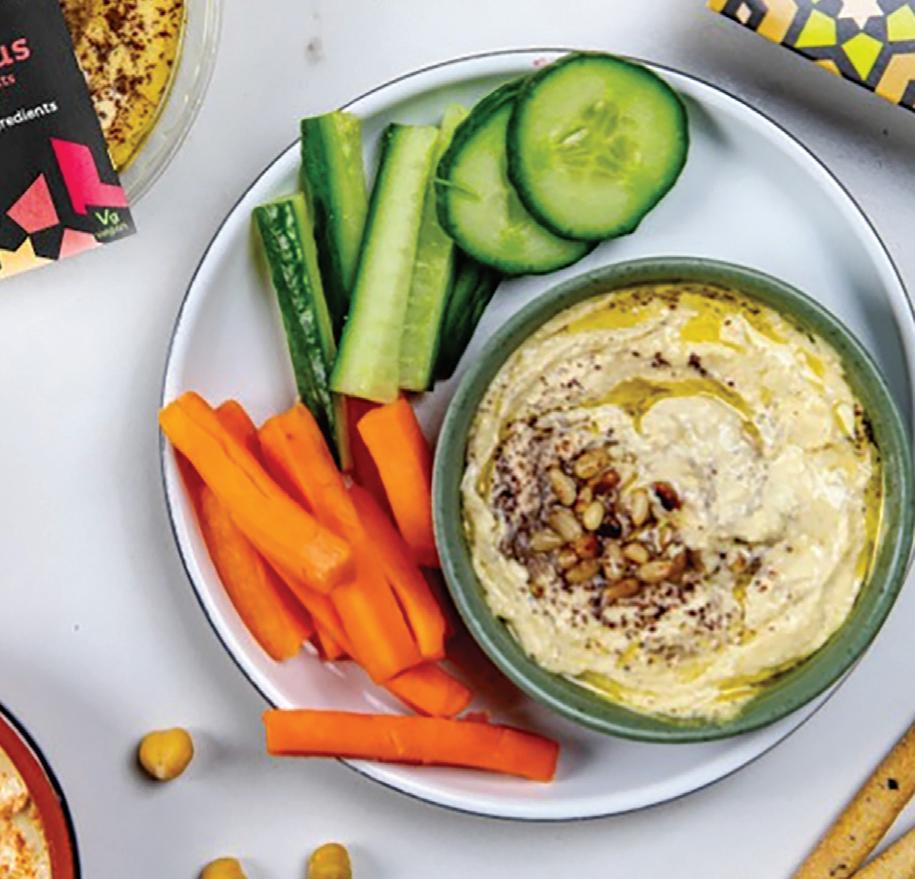
(10%) as the top five UK dip choices for summer. Opinions diverged, however, on what people had with their dips. Some people liked a tortilla or bread stick in their favourite dip, whilst others went for carrots or cucumber sticks. Almost one in 10 (7%) said they would use their fingers to enjoy a dip – perhaps not ideal for a shared meal occasion.
The results suggest a broadening of picnic menus, with many people including a mix of traditional and newer food options. While classic items remain popular, there appears to be a room for a wider range of tastes and dietary preferences.
The Victor Pizza Co }

It’s V
From a humble Glasgow bakery to a beloved name in Scottish food, The Victor Pizza Co is rising to new heights - and it’s just getting started.
Walk into any fish and chip shop in Scotland and you’ll likely spot a local delicacy on the menu: the deep-fried pizza. Or, as it’s more affectionately known, the Pizza Crunch. What most people don’t know is that this nostalgic staple started life in a small bakery in Glasgow in the 1970s- and it’s all thanks to a man named Victor.
Founded in 1970 by Bert Hoey, the bakery originally made bread and rolls for the Darnley community. But everything changed in 1972, when the Italian owner of the chip shop next door made a unique request: could
they recreate the pizza fritta of his Neapolitan hometown- a pizza that could be fried in oil? After perfecting the recipe, word spread fast. The pizza was a hit. And in tribute to their neighbour, the business renamed itself Victor Pizza. From that moment, the chippy pizza was born- and Scotland would never look back.
The company changed its name to Victor Pizza in honour of the man who had set them on the road to this incredible change in fortunes, and fast forward to today, and Victor Pizza is a thriving, award-winning

food manufacturer supplying 95% of the chip shop market in Scotland.
When husband and wife duo Anne Marie and Paul Cairney bought the business in 2006, Victor Pizza was still making its iconic deep-fried pizza- but also ran a busy wholesale distribution arm. Under the Cairneys, the business focused its energy on pizza manufacturing and began scaling up with big ambitions and a big heart.
“We sit in a really unique space,” says Melissa Cairney, daughter of Anne Marie and Paul, and now Head of Marketing. “Victor Pizza blends traditional chip shop favourites with award-winning innovations. We’re known across the UK as a trusted supplier to schools, councils, wholesalers, and the iconic Scottish takeaway scene”.
In 2016, the leadership team sought growth and expansion. They acquired a new larger premises in Milton and began to develop a new frozen range of pizza, aimed at the UK wholesale market. This range included a nutritionally balanced pizza for schools and health-focused customers (designed by Eat Balanced), wholemeal bases, garlic pizza breads, and new product development lines like buffet bites and pizza wraps… all made from scratch in Glasgow by a highly trained, tight-knit team.
Since Covid, the company has experienced
substantial growth, and so to keep up with demand, the business has now invested in a brand new 26,000 sq ft site in Coatbridge, more than doubling its production capacity and creating 17 new jobs.
“Once complete, this site will allow us to double our production capacity and create room for further innovation and product development.
"The new site is being equipped with upgraded freezing systems, improved production lines, and solarready infrastructure. We've also invested in modern staff facilities, breakout spaces, a daily staff bus, and new systems to support training and quality control.”
“We’re not just investing in capacity,” says Melissa. “We’re investing in people. Victor Pizza is proudly powered by our 38 amazing staff, most of our senior team started with us as teenagers, with no formal qualifications. Now they’re leading departments. That’s something we’re really proud of.”
Melissa adds: “Our customer impact is directly linked to this approach. Staff knowledge and pride in product quality have enabled us to grow our customer base by 27 percent and increase revenue from £1.7 million to £5 million in under 3.5 years. We’ve won major contracts with schools, wholesalers, and councils, thanks to consistency, service, and reliability- all driven by our people.
“We’re known for looking after staff. Many of our staff


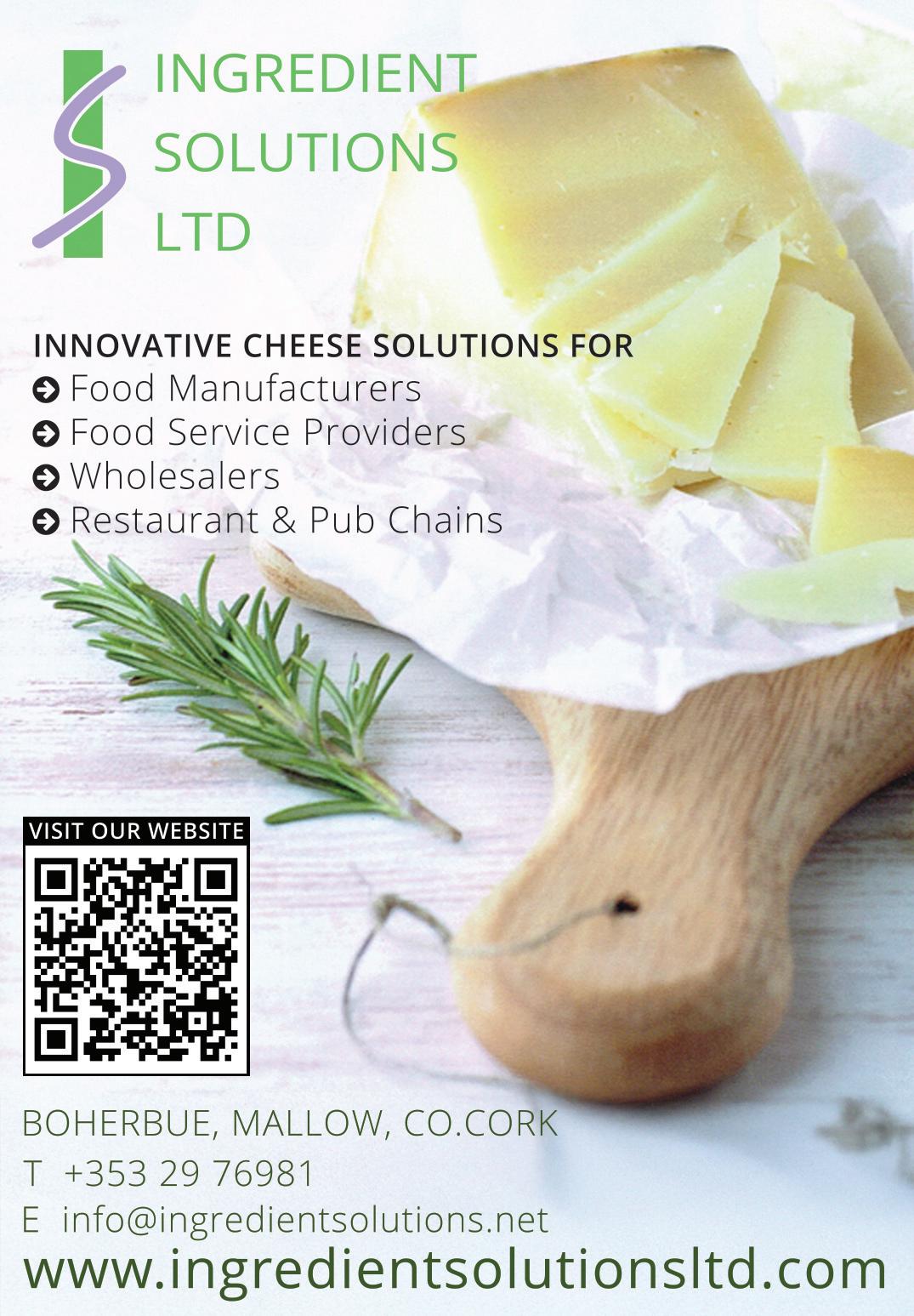




recommend friends and family to join. One beloved team member, Janet, stayed with us for decades.”
The company offers benefits like paid driving lessons and travel time, referral bonuses, mentoring, and regular training. “It’s not just pizza we’re making,” Melissa adds. “We’re building futures. And that’s what fuels our growth.”
Staff are involved in all stages of the company development, from factory layout to product tastings. The company has embraced Lean Manufacturing, working with Scottish Enterprise on food waste reduction, and the new 24,500 sq ft factory in Coatbridge has been designed to support future innovation - including better freezing systems, product development areas, and solar preparation.
Melissa says, “In a crowded market, we don’t just make pizza. We make it personal, scalable, and sustainable- with products people love and a process that’s always improving.”
The company has seen constant year-on-year growth, driven by their strong relationships with their wholesalers, customers and foodservice partners.
That people-first culture has had tangible results: in just two years, Victor Pizza has grown revenue by over a million pounds, expanded its customer base by 27%, and won multiple new contracts across foodservice and education.
One of the most significant innovations is the Eat Balanced Pizza, created with nutrition brand Eat Balanced and the University of Glasgow. Specifically designed for schools, the pizza contains no added saltinstead using Scottish seaweed for flavour and iodineplus red pepper paste for added vitamins and prebiotic fibre for gut health. It meets strict school standards while still tasting like, well, real pizza.
Melissa explains, “To support this growth, we’ve made major investments back into the business. This year, we

secured a seven-figure funding package from Bank of Scotland to purchase and fit out our new factory in Coatbridge. This move will more than double our production capacity and create 17 new jobs.
"We were previously named Scottish Family Business of the Year and have become a trusted supplier across the UK to wholesalers, schools, councils, and iconic chip shops. Our nutritionally balanced pizza, developed in partnership with Eat Balanced and the University of Glasgow, has won multiple awards and is now served nationwide.
Alongside its nutritional innovation, Victor Pizza is also working with Scottish Enterprise on projects to reduce food waste and improve sustainability. Its new Coatbridge factory has been designed with the future in mind- from solar panel installation to Lean Manufacturing and digital training systems.
Despite the modernisation, Victor Pizza has never lost sight of its roots.
“The original Darnley team still works with us,” says Melissa. “Generations of families- cousins, neighboursall side by side. There’s a real sense of loyalty and belonging that’s hard to manufacture.”
That culture comes from the top. Anne Marie, our owner, is known fondly as the Chief Soup Maker- not just for her legendary home-cooked lunches, but for the way she looks after the team. She’s in every day, sleeves rolled up, keeping the place running with heart and humour. It’s that energy that makes Victor Pizza more than just a workplace- it’s a family.
And while Scotland’s favourite chippy pizza may have been born from a neighbourly ask, the Victor Pizza team shows that good things happen when you honour tradition, back your people, and dare to grow.
“It started with a fried pizza,” Melissa smiles. “Now we’re shipping pallets across the UK. We’ve come a long way- but we’re just getting started.”
The carousel of the machine rotates in steps every second. A robot arm grips finished glass tubes, about two meters long, from fully automated glass storage and transfers these to vertical holders in the machine. With each movement, this guides the glass blanks past horizontally arranged flames at 1,000 degrees to heat the glass. Tools in the machine shape the hot mixture before the glass is then clipped at the end of the process. As a final product, ampoules for liquid medicines leave the machine in the production hall of SCHOTT Pharma AG & Co. KGaA Müllheim. The quality of the small vessels is checked in clean rooms before they are packaged. In order to ensure that these areas are free of particles in accordance with the clean room class, they are secured by airlock doors, which are equipped with EFA-SRT® Cleanroom high-speed doors from EFAFLEX.
“When considering the construction of new doors and the replacement of doors in existing buildings, we have generally chosen a supplier of high-quality doors and a very good level of service”, reports Michael Bury, Head of Technical Service at the Müllheim site. The mechanical engineer is responsible for the construction projects and the technology in the plant. Depending on the installation situation, the doors in the factory must meet different requirements. High energy efficiency is very important for the doors used to close the halls. He refers to other aspects in the use of a material lock: “These airlock doors from the EFA-SRT clean room series from EFAFLEX, for example, are very pressureresistant. Our clean rooms are operated with an overpressure of 35 pascals. This ensures that when the doors are opened, air can only flow outwards.”
With door systems for clean rooms in classes 5 to 7, which are certified according to DIN EN ISO 14644-1 and VDI 2083, EFAFLEX offers a wide range of options to professionally close sensitive areas. The doors are impressive due to their high air tightness in combination with a complex door leaf guide that prevents unwanted air exchange in the event of pressure differences. The smooth surface structure and edgeless design of the high-speed doors facilitate cleaning and largely prevent particles from settling. Quick opening and closing increases economic efficiency in the clean room. This keeps the filter load low and reduces air loss.
Two more EFA-SRT®-ECO doors open very quickly after one another between the production area and the connection corridor to the warehouse. A third door with transparent, insulated slats, arranged at a right angle to the outside, remains closed. The insulated door in the refuse lock, which had been installed by the general contractor, had to be replaced by EFAFLEX after a short time because it could not cope with the many load cycles. “Our disposal area is located behind this”, explains Michael Bury. The two inner doors and the outer one are interlocked with each other. This means that the employees can open either only the outside door or the two inner doors. “This avoids the introduction of particles and, above all, insects into production”, the Head of Technology continues. “We are a supplier to the pharmaceutical industry. Consequently, we work under the strictest conditions. If we were to detect contamination in a single package, such as from insects, it would be impossible for us to deliver the entire batch.”
The 13 billion medicine containers that the leave the factories of SCHOTT Pharma AG & Co. KGaA each year contain, among other things, vaccines and liquid medicines, which then make their way to patients all over the world.
The two EFA-SRT®-ECO airlock doors in front of the disposal area have already completed 221,000 load cycles in under a year. “At this point, the doors had to be as wide as the corridor, because we are also bringing new equipment into production along here”, explains Michael
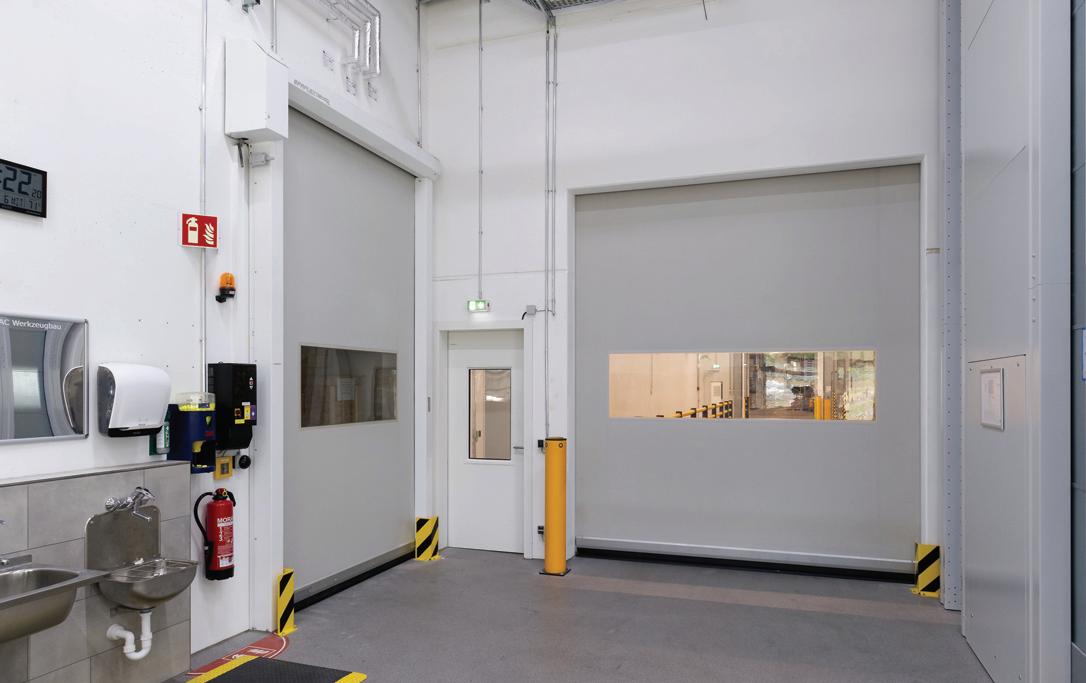
Bury. The narrow side door cases and the space-saving design of the high-speed doors make this possible.
At present, there are forty doors from specialist manufacturer EFAFLEX installed at SCHOTT Pharma AG & Co. KGaA in Müllheim. “Soon it will probably be sixty to seventy”, announces Michael Bury.
A high-speed EFA-SST-L ECO spiral door is installed in a warehouse in the existing buildings. The maximum clearance height is required at this entrance to the hall. As it would therefore not be possible for a normal round spiral to fit under the ceiling, a door with an oval spiral was installed here. “The EFAFLEX field service always recommends the right solutions for each of our tasks. This means that we can install modern, high-quality doors from EFAFLEX even in auxiliary buildings.”
This state-of-the-art operating equipment, which complies with all standards, is very important for a supplier to the pharmaceutical industry such as SCHOTT Pharma AG & Co. KGaA. Pharmaceutical companies must be able to rely on their medicines being delivered to patients safely, quickly and reliably with SCHOTT Pharma products.
SCHOTT Pharma employs over 4,700 scientists, pioneers and problem solvers in North America, Europe, Asia and Latin America. The company operates 17 GMP-compliant manufacturing facilities around the world to serve customers locally and shorten delivery times. SCHOTT Pharma’s product portfolio ranges from drug storage solutions to drug delivery systems manufactured in cooperation with leading industrial partners. The range of pharmaceutical syringes, cartridges, vials and ampoules is one of the most comprehensive and advanced on the market for injectable medicines.
EFAFLEX produces high-speed doors for industrial applications. The company, which was founded in 1974, works for clients from industry, trade, food production, and the chemical and pharmaceutical industries, among others. As the only manufacturer in the field of high-speed industrial doors, EFAFLEX is listed in the world market leader index and is therefore one of the top 461 companies in Germany, Austria and Switzerland. The family company employs more than 1,200 people worldwide. With its headquarters in Bruckberg, Bavaria, EFAFLEX is firmly anchored as the largest employer in the region. In addition, the company opens up international markets with 10 subsidiaries on five continents. EFAFLEX generates over 40% of sales abroad.
EFAFLEX Press Contact:
Ms Jasmin Jobst
Tel.: +49 8765 82-525
E-mail: Jasmin.Jobst@efaflex.com
Web: www.efaflex.com

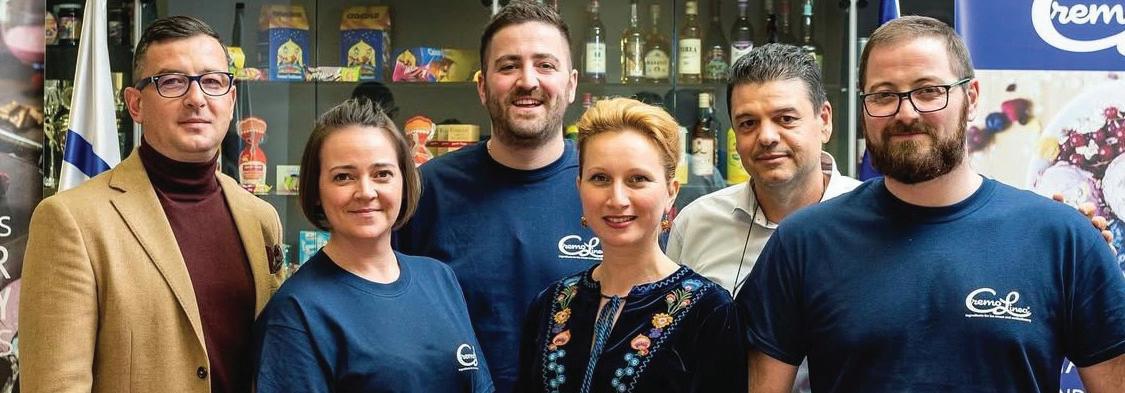
Collaboration, innovation and supporting clients — those are the three pillars that Takeaway Supplies Ltd (TAS Group) is built on, and they are never better illustrated than with the company’s association with European partner Cremolinea.
TAS Group, based in Dukinfield, Cheshire, is a national ice cream packaging, food packaging, food ingredients and point of sale items stockist and distributor, specialising in supplying a wide range of containers, ingredients and unique point of sale items.
TAS Group works with many different sectors of the food industry, both food service and manufacturing including ice cream and gelato manufacturers, wholesalers and sellers. bakeries, deli’s and takeaways as well as catering firms and events organisers.
And it's been a busy couple of years for the company. Jonathan Susca, head of sales, explains: "We're always evolving to meet the needs of our customers and the wider food industry. Recently, we've expanded our product range to include even more sustainable and innovative packaging solutions, responding to the growing demand for eco-friendly options without compromising on quality or presentation.
“We've also strengthened our ingredient offering, particularly within the ice cream and dessert sector, bringing in exclusive lines from top European partners like Cremolinea. These products give our customers more creative flexibility and premium results.”
TAS Group has a wide range of partners and collaborations, but the long-standing Cremolinea link up is a perfect example of what they do.
Jonathan says: “One standout project has been our continued collaboration with Cremolinea, a specialist European supplier of high-quality gelato ingredients.
“We've also had the amazing opportunity to take some of our customers out to Cremolinea’s headquarters in Romania. These trips have been incredibly valuable - not just for building knowledge, but for strengthening the partnership between suppliers and end users. It’s experiences like these that go { Cremolinea (TAS group) }

“Together, we've hosted a series of award-winning demo days and exhibitions across the UK, which have been fantastic opportunities to showcase new products, share technical expertise, and bring our customers together for a bit of fun - and a lot of gelato tasting!
beyond the transactional and help form lasting relationships in the industry.
It's a project that perfectly reflects what TAS Group is all about: collaboration, innovation, and supporting our customers with more than just a product list.”
The Cremolinea collaboration is a major success, but that doesn’t mean TAS Group isn’t hungry for more.
Jonathan says: “Our client base has grown steadily over the past year, which is something we're really proud of.
“While we continue to support our long-standing customers - many of whom we've built fantastic relationships with over the years - we've also welcomed a number of exciting new clients across the UK and beyond.
"This includes everything from independent ice cream parlours and bakeries to large-scale food producers and wholesalers. Much of this growth has come from word-of-mouth, referrals, and our reputation for combining quality products with genuine, hands-on service.
“We've also seen increased interest from new sectors thanks to our expanded range of packaging and ingredients - especially those looking for more sustainable, innovative solutions.”
This reputation as a leader in the packaging industry means that TAS Group is now turning that experience and expertise into other areas — helping clients develop products from the ground up.
“We're always looking for new ways to add value for our customers,” says Jonathan. “One of the most exciting developments is that we're in the process of offering full concept solutions. That means not just supplying ingredients and packaging, but helping our customers bring entire product ideas to life - from recipe development and branding right through to final presentation.
"We've also expanded our technical support services, offering more in-depth guidance on formulation, flavour trends, and production methods. Whether someone's launching a new gelato range or reinventing a dessert menu, we want to be the go-to team that helps make it happen.
On top of that, we're continuing to collaborate with our suppliers to bring in exclusive products and innovations that give our clients a real edge in the market. It's all part of our commitment to staying aheadand helping our customers do the same.”
One of TAS Group’s key priorities is securing a new warehouse facility which will give them space and flexibility to expand their product range and improve delivery times. At the same time, sustainability is also a big focus, and the company is committed to expanding their eco-friendly product
range as well as helping clients reduce their environmental footprint.
Jonathan says: “All in all, it's about growth with purpose — delivering more value, innovation, and support to our customers as the industry evolves.
“In five years, we'd love to see TAS Group as a leading national supplier and partner in the food packaging and ingredients sector, known not just for the breadth and quality of our products, but for the fullservice, innovative solutions we provide.
“We aim to have expanded our warehouse and logistics capabilities to ensure even faster and more reliable delivery, and to have firmly established our full concept offering, helping customers launch and grow exciting n e w products.
“Sustainability will remain at the heart of what we do, with a much wider range of eco-conscious products and processes in place — supporting our clients to meet their own environmental goals.
“Above all, we want to continue building strong, lasting relationships with our customers, suppliers, and team — because those connections are what make TAS Group truly special.”
www.takeawaysupplies.co.uk




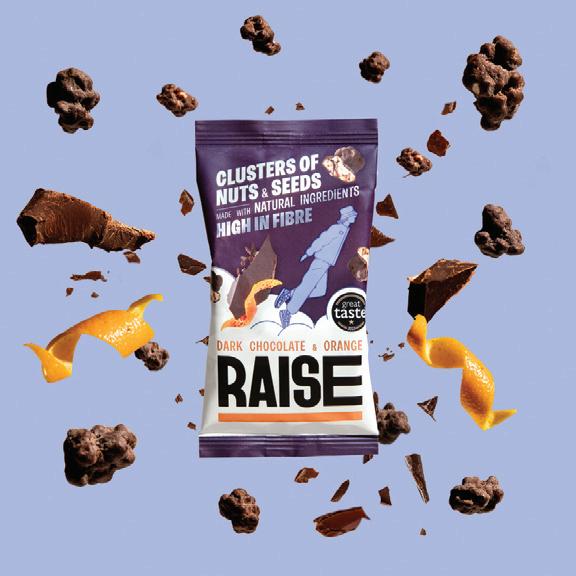

By anyone’s estimation, Chester Robinson likes to look after himself. An active, fitness-obsessed Londoner, you can often find him playing football and tennis or pounding the streets — he did a half marathon a couple of months ago and has a full marathon coming up in November.
What Chester always found was that, in both his exercise regime and his work as a young professional working in marketing, he needed a snack to fuel his activity or as a pick-me-up in the workday afternoons.
Chester said: “When I was living at home after university, I'd often take my mum's homemade granola with me to work. She started roasting nuts and seeds at home in order to give me and my siblings snacks after school or after sport.
"Whenever I didn't have my mum's roasted nuts and seeds on me, I'd look for an alternative on the supermarket shelves, something which was natural, something which was nutritious and something which, most importantly, tasted really good.”
He found it hard to find a snack to tick all those boxes. Protein bars he found were packed with “strange synthetic ingredients that I’d never heard of” and other snacks, such as popcorn, weren’t giving much nutrition.
It was then that Chester spotted a gap in the market, and the idea for RAISE Snacks took seed.
He said: When I started to look into the category more, I realised that no one was doing anything exciting with nuts and seeds. When it came to nuts, you'd often come across some sort of supermarket branded nuts, which would be, quite bland and a little bit boring.
“Other nuts would be oily and super salty, the sort of thing you’d have at the pub with a pint. When it came to seeds, they are incredibly nutritious just not that readily available.”

And the ethos for what would become RAISE was born. Something that was nutritious, healthy and tasty.
“Okay, we need food to fuel us, to keep us alive, to get us up for tomorrow and to make sure that we live a long, healthy life. But food's also about enjoyment, right?” said Chester. “And it's about that. You put something in your mouth and you have this burst of flavour which gives you an instant sense of gratification and puts a smile on your face.”
Chester initially started experimenting in his mum’s kitchen in Kensal Rise, London, before realising that what he had planned was going to need a lot more space and kit than was available. So once he’d started to nail down the recipes, he began to look for manufacturers to help him bring his dream alive.
Fast forward a couple of years, and RAISE is now working out of offices in Dalston and is on some major supermarket shelves, including Sainsbury’s, Ocado and Co-op, and is distributed by three major wholesalers, Brakes, DDC and Epicurium.
Chester said: “I think what's really interesting is we've had quite an unusual growth journey compared to other brands. A lot of brands will launch products in independent stores, or convenience stores and then they'll end up in Planet Organic, Whole Foods or Selfridges and then land in Waitrose, and then eventually end up in a Sainsbury's.
“We sort of skipped all those initial steps and ended up pretty much launching in Sainsbury's. So the challenge for us has been trying to build awareness of the brand in a very competitive environment from the start”
“But what is good is that people have been really interested in RAISE and consumers are enjoying it. We've got really strong customer loyalty, and a strong solo customer rate.
“What I mean by that is people that are literally walking into a store like Sainsbury's and only picking up a packet of RAISE and walking out. We've got a really high percentage of customers doing that, which is very encouraging.”
RAISE has also recently launched on Ocado, is available through branches of Leon, and is supplying restaurants, offices, universities and gyms.
Chester added: “What that screams to, is that RAISE is super versatile and works in lots of different environments, which is important for a snack.”
As well as their meteoric rise in just a couple of years, RAISE is also putting back into the community through its charitable programme. And, like the product itself, that is inspired by Chester's mum and how she fed her big family when they were all growing up.
He said: “Something we do is, for every packet of RAISE you buy, you donate to a young person at risk of hunger in the UK, in order to fuel their learning. And that's all done through our charity partner, The Magic Breakfast.

“So 1% of each pack goes to The Magic Breakfast, which is really cool. And we do lots of other things with them. For example, we ran a half marathon recently, which saw us donate about 3,500 meals to the charity.
“We're also doing a bike ride from London to Brighton with The Magic Breakfast, in September, to raise money for them. So yeah, we like to see ourselves as a snack brand that not only nourishes the people that are eating the snacks, but also the wider community."
www.raisesnacks.co.uk




Halloween
is often considered an American import to the UK, but in reality the tradition goes back thousands of years to the distant, pagan past of the country.
And even though the craze for Halloween goods might seem relatively recent, there will no doubt be people reading this who grew up in the 1970s and vividly remember carving jack o’ lanterns from turnips, before pumpkins became more prevalent!
But Halloween in its more commercial form is certainly here to stay and offers plenty of opportunities for the food and drinks sector.
According to leading global data and business intelligence provider Statista the UK Halloween market exceeded £775m in 2024 and is set to be even bigger this year.
Business analysts Prof say: “Today it’s a key event on the retail calendar and an important growth opportunity for food and drink businesses across both Private Label and brands.
“This year’s impact across UK retailers looks stronger than ever, taking a more dominant space across the stores and contributing to Halloween inspired displays across the store.
“This trend has inspired food retailers to push the boundaries of creativity, offering products that are both innovative and captivating. This year we are seeing exciting innovation across Private Label and brands further illustrating the commercial opportunity."
That’s backed up by recent YouGov data which revealed:
Over two in five Brits (41%) say compared to other holidays, Halloween is important to them or their
family members - a sentiment most echoed among 25to-34-year-old Brits (54%).
On the other hand, nearly three in five Britons (57%) say Halloween isn’t important to them and 55+ year olds (75%) are most likely to agree.
Further, half of all Brits surveyed (50%) don’t participate in any Halloween activities.
But among those who do, pumpkin carving is the most popular activity (27%) followed by decorating the home (23%) and watching Halloween-themed movies or shows (23%).
According to the Prof report, everyone’s getting into Halloween. They say: “Examples of how these categories are driving growth from wine bottles with Glow in the Dark Labels by 19 Crimes, frozen entertainment lines such as the range by Lidl from ghost shaped fish nuggets through to black ice cream cones or churros, chilled food innovation such as Frightful Flatbread Face, Pumpkin Bao Buns or Eye Want Pizza from Marks and Spencers. Further innovative confectionery such as Tongue Painting, Bewitched Bats, Scarily Sour Flying Saucers or Freakishly Fizzy Spiders by Aldi, Halloween biscuits, cakes and doughnuts by Tesco can also be found.”
It’s said that most people start thinking about their Halloween experience in August, and are looking around for the best products to pick up for their seasonal parties, whether that’s for adults or children.
So what should retailers be doing? The Prof report
says: “By offering unique and themed products, retailers can differentiate themselves from competitors and attract consumers seeking to enhance their celebrations.
“This focus on innovation not only drives sales but also reinforces brand loyalty as consumers associate these creative offerings with positive holiday experiences.
“Understand the latest food trends driving growth in Halloween and those categories that resonate the strongest with consumers helps food and drink manufacturers recognise the growth opportunity in both domestic and international markets.
“As Halloween becomes an increasingly important part of the retail calendar, the focus on innovative products will be essential in capturing the hearts and wallets of consumers.”
According to data analysts Mintel, 2024 saw a much higher engagement from brands and retailers for Halloween — however, the projected high yields weren’t quite achieved due to fragile consumer confidence.
However, that might have changed this year, says Mintel: “As consumer confidence improves and inflation continues to ease, demand is expected to rebound for 2025.
“Higher-income households, which drove spending for Halloween and Bonfire Night in 2024, are likely to remain key spenders, but continued financial recovery across middle-income households should boost spending for both events in 2025, particularly if retailers engage in the same level of promotional activity.
“Retailers can capitalise on this momentum through entertainment-focused seasonal ranges for in-home celebrations. By aligning products with new film releases and popular TV shows, they can inspire consumers to elevate celebrations at home, driving further engagement. Offering film-themed products for at-home celebrations also allows retailers to extend the festive spirit beyond a single day. This creates a longer window to engage customers and capitalise on the celebratory mood with curated products.”




— but it will be hard-won
There is cautious good news for the restaurant sector after some tough years — growth is on the way.
That's the forecast from several business analysts who say 2025 is the year the trade started to bounce back, after suffering the blows of Covid and the cost of living crisis.
At the start of the year, FutureFoodservice’s report The Next 5 Years 2025-2029 said that the out-of-home dining market looks like it will grow by 2.4 per cent by the end of this year, reaching a total market value of £105.3 billion.
That said, it’s not going to be plain sailing, as anyone in the restaurant trade already knows. In July, analysts and accounts BDO released their annual restaurant and bars report, Turning the Tables.
Mark Edwards, BDO Partner and Head of Leisure and Hospitality, said: “There cannot be many sectors where when challenges continue to mount up, the enthusiasm to improve, innovate, develop and deliver seems to swell in greater measure.
“While there was much expectation surrounding 2024 and moving into 2025, the reality is that trading has been much tougher than anticipated with costs
rising more sharply as well.”
BDO delayed the release of their report because they were hoping the UK Government’s Spring Statement might have offered some relief for businesses — it didn’t, and was immediately followed by the turmoil surround US President Donald Trump announcing widespread and hard-hitting tariffs. Which, says Mark, means that the domestic restaurant trade has to fall back on its other strengths.
He said: "This leaves us with the reality that there is currently limited chance of a boost to trade from macro-economic factors so operators are really focusing on operational excellence.
"The growth period for the sector may be slower in accelerating than hoped and may even be fragile for some period to come, but the foundations are well laid.
“Culturally, in the UK as elsewhere, there is no evidence that we are becoming more socially isolationist. The idea of eating out, socialising, going away from home for holiday, visiting friends and family, is as important to consumers as ever and so focusing
on what you can control now is crucial.”
Simon Stenning, founder of FutureFoodservice, said earlier this year: "The hospitality/foodservice industry continues to face enormous challenges with increasing costs of labour and higher costs of doing business.
"We have to be cautious with our positive message in this report, as we recognise that not all businesses will survive the challenging conditions.
"It is easy to point out the opportunities from being creative, innovative and from investing in new concepts. What we forecast is that attracting consumers is the key to success and that there will be many operators who do, and will continue to do so, over the course of the next five years.”
The BDO report says success will come to those operators who think outside the box. It says: “Success will depend on offering experiences that justify the cost. Restaurants will experiment with hybrid service models, incorporating self-service kiosks and digital ordering to streamline operations while maintaining a personalised experience. Dynamic pricing strategies, such as time-sensitive discounts or off-peak meal deals,
may emerge as ways to drive footfall without eroding margins.”
The report adds some positive news on the horizon with the Government announcing its intention to create fairer business rates for the hospitality sector in 2026-27, which is a major cost facing many businesses.
The BDO report says: “This topic will be closely monitored as businesses navigate the next few years and hope to benefit from reduced rates. There is an increasing number of empty retail units on UK highstreets, and a prolonged fall in the base rate will put pressure on landlords who will need income to cover their own debt service costs.
"This may create opportunities for businesses to achieve positive deals on leases, as landlords favour having a tenant at a lower rent than an empty unit with no income. Whilst consumers have reduced their discretionary spending, there has been a trend since the Covid-19 pandemic in consumers searching for an experience and an increasing willingness to spend on new, unique and value for money experiences.”


